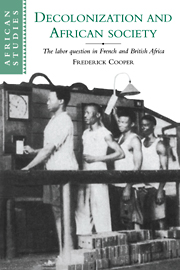Book contents
- Frontmatter
- Contents
- List of tables and figure
- Preface
- List of abbreviations
- Map of French and British colonial Africa
- 1 Introduction
- Part I The dangers of expansion and the dilemmas of reform
- Part II Imperial fantasies and colonial crises
- Part III The imagining of a working class
- Part IV Devolving power and abdicating responsibility
- Introduction
- 10 The burden of declining empire
- 11 Delinking colony and metropole: French Africa in the 1950s
- 12 Nation, international trade unionism, and race: anglophone Africa in the 1950s
- Conclusion: the social meaning of decolonization
- Conclusion
- Notes
- Bibliography
- Index
- OTHER BOOKS IN THE SERIES
12 - Nation, international trade unionism, and race: anglophone Africa in the 1950s
Published online by Cambridge University Press: 22 February 2010
- Frontmatter
- Contents
- List of tables and figure
- Preface
- List of abbreviations
- Map of French and British colonial Africa
- 1 Introduction
- Part I The dangers of expansion and the dilemmas of reform
- Part II Imperial fantasies and colonial crises
- Part III The imagining of a working class
- Part IV Devolving power and abdicating responsibility
- Introduction
- 10 The burden of declining empire
- 11 Delinking colony and metropole: French Africa in the 1950s
- 12 Nation, international trade unionism, and race: anglophone Africa in the 1950s
- Conclusion: the social meaning of decolonization
- Conclusion
- Notes
- Bibliography
- Index
- OTHER BOOKS IN THE SERIES
Summary
Having been backed into accepting African self-government in the Gold Coast, British officials watched – with at least a touch of admiration – as Nkrumah and the CPP sought to tame and mold the labor movement. Like French officials welcoming the rise of the highly nationalist UGTAN and misreading the intentions of Sékou Touré, their confidence to manage their modernizing project had all but dissipated even if they clung to the project itself. Operating in a different institutional framework from the other fading empire, British officials faced similar problems and a similar need to convince themselves that they could leave without admitting that their entire effort to transform Africa was a failure. This chapter considers two manifestations of Great Britain's ambivalent disengagement from Africa: its thinking about trade unionism in relation to newly self-governing regimes and to international labor organizations, and its approaches to government personnel in the transition. Both Great Britain and France were in a sense accepting that social transformation was a global process, not a project for a particular empire. All they could do, in effect, was try to keep Africa in the “West.” In the labor field, this meant working with the anti-communist International Confederation of Free Trade Unions as the only viable alternative to the World Federation of Trade Unions. They did this grudgingly and bitterly – the ICFTU was too critical of colonialism for their taste. Trying to navigate between communism and extreme nationalism in regard to labor organizations, transitional regimes were also facing the fact that the largest body of wage workers were their own employees and that the categories of civil servant and worker remained both unclear and deeply racialized.
- Type
- Chapter
- Information
- Decolonization and African SocietyThe Labor Question in French and British Africa, pp. 432 - 450Publisher: Cambridge University PressPrint publication year: 1996



